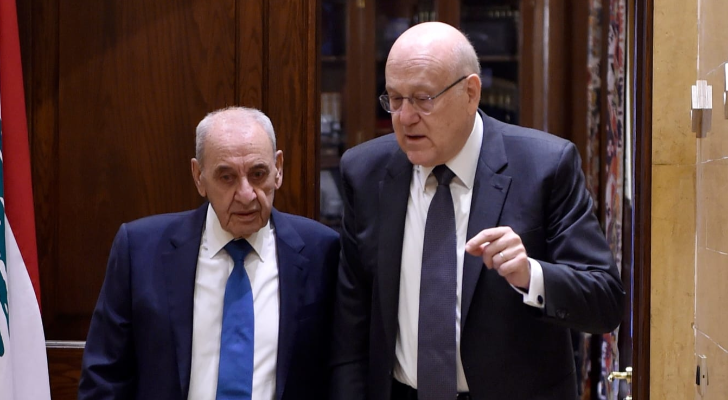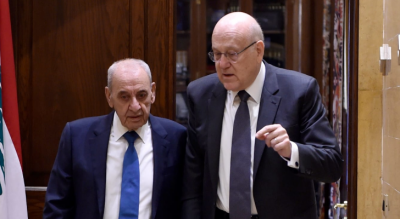Lebanese political forces, led by the Shiite duo (Hezbollah and Amal Movement), are approaching the information they have received with cautious optimism regarding the potential for a ceasefire on the Gaza front before the 24th of this month, the date scheduled for Israeli Prime Minister Benjamin Netanyahu's visit to the United States. Prominent Lebanese sources confirm that Netanyahu has no escape from the American pressures imposed on him, a sentiment relayed to him by influential Arab and international parties involved in the negotiations between Cairo and Doha.
These Lebanese sources, speaking to "Asharq Al-Awsat," highlight that one cannot rely on optimism about reaching a ceasefire between Hamas and Israel in the Gaza Strip unless words are accompanied by actions. They emphasize that if a ceasefire occurs without preconditions set by Tel Aviv, it would inevitably lead into a new political phase, which should impact southern Lebanon, defusing tensions to prevent the expansion of the war, preparing for a settlement that brings stability by ceasing Hezbollah's support for the Gaza front.
The same sources assert that the cautious optimism among political forces regarding a ceasefire in Gaza is not unfounded, revealing that Hamas's leadership is not far from this sense of optimism, with its officials in Lebanon sharing this sentiment with their allies, primarily Hezbollah, indicating that international and Arab pressure on Netanyahu is increasing. However, they clarify that nothing is definitive until this optimism reaches a conclusion.
Moreover, the sources view Netanyahu's discussions in Washington as a test of his willingness to agree to a ceasefire in Gaza; his agreement would allow the American mediator Amos Hochstein, currently vacationing in Greece, to resume efforts from Beirut aimed at reaching a settlement that restores stability in southern Lebanon, based on the application of Resolution 1701.
They add that Hochstein's return to Beirut would inevitably lead to a decline in the initiative launched by opposition forces to resolve the presidential election impasse, especially since their meetings to promote the roadmap intended to culminate in a meeting between the loyalty to the resistance blocs (Hezbollah) and the Development and Liberation bloc led by Speaker Nabih Berri have not received support from the parliamentary majority, particularly from representatives positioned midway between the opposition and the resistance axis, in addition to members of the Democratic Gathering and the Strong Lebanon bloc led by MP Gebran Bassil, who positively engaged without obstructing Berri's invitation for consultation, having managed to open a new chapter with him that he is not inclined to disregard.
Political sources assert, from their monitoring position of the movements aimed at breaking the impasse in the presidential election, that those involved in the election are passing off responsibility by blaming each other for obstructing the electoral process, although they equally extend the presidential vacancy, regardless of their mention of initiatives that come from an appearance of lifting burdens.
In other words, all those involved in the presidential election meet, one way or another, at a crucial point regarding postponing the presidential election until after the ceasefire in Gaza and the conclusion of Netanyahu's visit to Washington, estimating that the region is currently on the verge of a transition to new political arrangements that could affect Lebanon. Thus, they deem it necessary to wait until the situation heats up enough to allow them to engage with the presidential election through these arrangements.
The same sources even rule out the possibility that Netanyahu would, upon his return from Washington to Tel Aviv, overturn the situation amid pressures exerted on him from hostage families and military and security institutions to continue his war in Gaza, which could spill over into southern Lebanon. His refusal to comply with American pressure for a ceasefire on both the Gaza and southern fronts could lead him into conflict with U.S. President Joe Biden, who would be compelled to use his influence to press him, so as not to be accused of giving him the green light to continue his invasion of Gaza and Rafah, which could ignite confrontations in the south.
**Freezing the Quintet's Efforts**
The opposition's initiative to advance the presidential file will eventually join previous initiatives, while ambassadors of the Quintet have decided to freeze their efforts to facilitate the presidential election until after the situation in Gaza and southern Lebanon is clarified.
However, in the meantime, as the sources point out, it is essential to monitor developments regarding the caretaker government in light of Berri's efforts to restore political calm between its head, Najib Mikati, and the head of the Free Patriotic Movement, MP Gebran Bassil. This was clearly demonstrated when Minister of Culture Judge Mohammad Wissam Mortada, commissioned by Berri, was able to resolve the dispute between Minister of Defense Maurice Slim and Army Commander General Joseph Aoun concerning all matters related to the military academy files.
"Asharq Al-Awsat" learned that Mikati, who is avoiding political clashes with his opponents, is now entering into a détente with Bassil in response to Berri's desire, although he is not allowing Bassil to permit his allied ministers to participate in government sessions, adhering to his boycott due to the President's absence.
In this context, Berri played a role in dissuading Finance Minister Youssef Khalil from resigning from the government after he expressed a desire to do so for over a year, although parliamentary sources preferred not to delve into the reasons, simply stating to "Asharq Al-Awsat" that he responded to his wish and decided to withdraw it.




